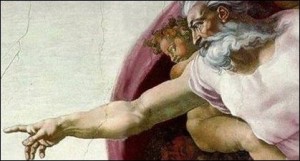In Luke 1, Mary bursts out in song. That’s what “magnify the Lord” is all about. Her joy of the apprehension of the person of the child she carries and His divine roll as “savior” of the world is too much to contain! Understanding the lost status  of all mankind, including herself, she recognizes that this salvation is what people of every generation have been longing for and what people of every generation hereafter will be able to sing about as well. In verse 51, she continues the “magnification” of God’s greatness with a new thought. She sings, “He has done mighty deeds with His arm…” The bible also mentions God’s eyes and ears (Ps. 34:15), finger (Exod. 8:19; 31:18; Deut. 9:10); face (Ps. 27:8, 9; 143:7), and even nose (Exod. 15:8; Isa. 65:5). These references are not to be taken literally as some mainline cults do.
of all mankind, including herself, she recognizes that this salvation is what people of every generation have been longing for and what people of every generation hereafter will be able to sing about as well. In verse 51, she continues the “magnification” of God’s greatness with a new thought. She sings, “He has done mighty deeds with His arm…” The bible also mentions God’s eyes and ears (Ps. 34:15), finger (Exod. 8:19; 31:18; Deut. 9:10); face (Ps. 27:8, 9; 143:7), and even nose (Exod. 15:8; Isa. 65:5). These references are not to be taken literally as some mainline cults do.
Mary was completely at home with the Old Testament. She was a spiritual woman who reflected and pondered the truths of God and there relevance for her own life. She was very familiar with the phraseology of the Old Testament and her song is full of its language. The Old Testament often speaks anthropomorphically of God in order that we might grasp something about His work in our world. According to the Old Testament God’s “arm” is primarily associated with God’s acts of salvation. God’s arm saved Israel from Egypt, Jonah from the belly of the whale, the Israelites from their enemies, and all mankind from their sin. God’s arm that gathers and protects those who “fear Him” as Mary sings in verse 50. But she adds that it’s with His arm that He “scatters those who are proud…” As John says in His Christmas Narrative in chapter 1 of his gospel, “to those who have received Him, to them He gave the authority to become children of God.” Unfortunately, John continues, most “received Him not.” She continues, “He has brought down rulers from their thrones, and has exalted those who were humble. He has filled the Hungry with good things, and sent away the rich empty handed.”
A new economy is established. The last are now first. The hungry are now filled. The least become the greatest, the have’s become the have not’s and the have not’s become the have’s. It begins with “the fear of the Lord.” As Mary well knew, the Old Testament ascribes many benefits to those who “fear Him.” Kitchen writes, “It is not only the beginning of knowledge (Prov. 1:7, 29; 2:5) and wisdom (9:10; 15:33), but it instills confidence (14:26) and makes rich (22:4). The fear of the Lord prolongs life (Prov. 10:27), is a fountain of life (14:27), leads to life (19:23), and is rewarded with life (22:4).”